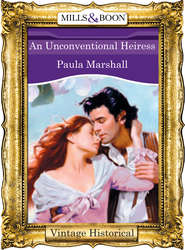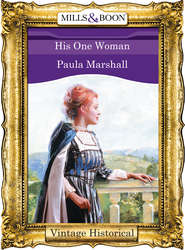По всем вопросам обращайтесь на: info@litportal.ru
(©) 2003-2024.
✖
Dear Lady Disdain
Автор
Год написания книги
2018
Настройки чтения
Размер шрифта
Высота строк
Поля
‘Only that, I suppose,’ returned Matt, his eyes wicked, ‘could bring him to wish to see me again—and Rollo’s death, of course. That must have been the final facer.’
‘You are pleased to be heartless…’
‘My father cut my heart out long ago,’ returned Matt carelessly. He was suddenly regretful of his baiting of the old man who had been the scourge of his childhood, youth and young manhood, until he had finally left England nearly twelve years ago, and added, a trifle stiffly, ‘I am wrong to allow my dislike of my father to take the form of tormenting you. You were kind to me, I remember, when I was invalided out of the Navy after Trafalgar, and no one else was.’
‘You brought your own doom on you,’ Grimes could not help retorting, ‘when you ran off with your brother’s wife. My sympathy for you died on that day.’ He saw Priestly’s face change, and knew that here was something Matt Falconer’s impertinent shadow had not known.
Matt Falconer was not nonplussed. He was no longer the eager boy who had yearned for his father’s love and whom his father’s lawyer could patronise.
‘Leave that,’ he ordered in his quarterdeck voice. ‘It has nothing to do with you, or with the business I have come to settle.’
But Grimes must have thought he had found a chink in Matt’s armour, although Matt was not conscious of possessing one, for he continued, although in a lower tone, ‘And her death does not lie on your conscience, Mr Falconer?’
Oh, the old man did have weapons to fight with after all! Matt closed his eyes, only for a sad and beautiful long-dead face to swim before them. The memories that face recalled had him swinging away from both men. For the first time in the interview he was struggling for self-control.
‘I lost my conscience with my heart,’ he asserted stiffly. ‘And if you refer to my late sister-in-law again, I shall leave this office and England within the day, and you, my inheritance from Lady Emily and my father may all go to the devil. Is that plain enough for you, sir?’
Matt was himself again—cold, strong and unshakeable, the man whom Jeb Priestley had always known, and whom the lawyer had never met. After that they returned to the business at hand, Grimes recognising that the man before him would never agree to any of his father’s demands, and consequently now wishful to settle the matter of the inheritance as rapidly as possible.
Pontisford Hall, his late great-aunt’s home on the borders of Nottinghamshire and Yorkshire, was the last reminder of Matt’s childhood, and the only happy one. He had a sudden burning wish to see it. He remembered warmth and love, and a place where he, as well as his older brother, had been welcome. Before he had reached England, on the boat over, re-reading the letter which told him of his great-aunt’s death and his inheritance, he had resolved to sell the Hall and its contents, to raise capital to enlarge his Virginia plantation, and partly rebuild and beautify the stark house which he called home.
But stepping ashore in England, travelling to London, seeing that great city’s sights, smelling its unique smell, had reminded him agonisingly of his past, of his youth, before the world had fallen in on him. He had a sudden yearning to revisit the scenes of his childhood—if only to say goodbye to them before he parted from his homeland for the last time.
He said nothing of this to Grimes, merely, ‘I shall travel to Yorkshire, sir, to pay my respects to Lady Emily’s tomb in Pontisford church, and to visit the Hall for the last time. She was kind to me, and I must not let her go without a proper farewell. You will inform the staff there of my proposed arrival. I shall set out as soon as I have completed other urgent matters here.’
Matt could imagine Jeb’s raised and mocking eyebrows at this rare display of sentiment, and the silent cynicism of the old lawyer, but damn that for a tale. When he had reached his middle thirties a man had the right to say goodbye to his youth.
And so it was settled. Mr Grimes did not pry into his client’s life. He assumed that Matthew Falconer had not married while in the United States, for there was no talk of a wife. He assumed that he had had some success as a plantation owner, but made no move to discover how much of a success. If the grim man before him wished him to know these things he would have told him. Once or twice he sighed for the carefree young man he had once known, who had faced life with a smile despite his father’s displeasure, but it was plain that that man was long gone.
Business was done, and done quickly—after the fashion of Yankees, Grimes presumed. The old Matt Falconer had never been businesslike, or hard. Now he was both. He even kept his insolent man on a tight rein while he and the lawyer went through the necessary business of establishing identity, examining Lady Emily’s will, and signing and witnessing the necessary documentation.
It was soon all over, and Matt and his man were in the street, holding their top hats on, braving the keen wind of early November, before Jeb spoke again.
‘Well, there’s a fine tale, Matt. Did you really run off with your brother’s wife?’
‘Yes, but not for the reason you might think.’ For once he was short with Jeb. Revisiting England must have made his memories keen again. He thought he had been rid of that old pain long ago.
‘Why, what other reason is there?’
Which, of course, was what everyone had said at the time. Matt replied, in what Jeb always thought of as his ‘damn-your-eyes’ aristocrat’s voice, which he had rarely used in the good old United States, ‘Nothing to do with you, Jeb. You may have the rest of the day to yourself. I shall meet you for supper at Brown’s this evening. We shall set out for Yorkshire as soon as I can organise suitable travel arrangements.’
There was no brooking him in this mood. Jeb rearranged his face, pulled a servile forelock, bowed low, mumbled, ‘Yes, massa, certainly, massa,’ a ritual which usually drew an unwilling grin from Matt. But not today. Today he was unmoved, immovable, and his shadow, wondering where his master was going, would have been surprised to learn that he ended the afternoon in a church, before a marble memorial consisting of an urn held by a weeping Niobe whose inscription simply read, ‘To the memory of Camilla Falconer, Lady Radley, 1785-1806, cut down in her youth… “Cometh forth like a flower”.’
Naturally there were no pious words chiselled into the marble about loving wives or grieving husbands, and she was buried far from her home and friends, forgotten, probably, by everyone except the grieving man who had come to pay her his last respects too.
Chapter Two
Everything, but everything, had gone wrong from the moment they had left the confines of the Home Counties. Stacy thought that there must be a curse on the journey, her first of any length since her father had died.
And it had all gone so beautifully right at first—inevitably, with Ephraim and herself arranging things. She was to travel incognito; it would not do to let possible men of the road know that the enormously rich owner of Blanchard’s Bank was travelling nearly the length of England in winter. Safety lay in anonymity. She was to be Miss Anna Berriman, to match the initials stamped on her luggage and entwined on the panels of her elegant travelling coach. Polly Clay, her personal maid, and the other servants had been carefully coached for the last fortnight before they set out to address her as, ‘Yes, Miss Berriman’, ‘Indeed, Miss Berriman’, ‘As you wish, Miss Berriman’, until Stacy had almost come to believe herself Miss Berriman in truth.
They were taking two coaches to accommodate Stacy, Miss Landen, Polly, James the footman, young Mr Greaves and his man, a coachman, and a spare footman, Hal, a big strong man, to act as yet another guardian to the party. It occurred to Stacy, as she watched the two post-chaises being loaded with luggage and impedimenta, that throughout her life she had rarely been alone, and for a moment she wondered what it would have been like truly to be not-so-rich Miss Berriman, who was no more and no less than an ordinary, unconsidered spinster. She decided that the uncomfortable truth was that on the whole she would not have liked it. She had grown used to being in command in exactly the same way as a man would have been.
It was while they were crossing from Lincolnshire into Nottinghamshire through heavy rain, after an unpleasant night in a dirty inn, that Greaves’ cold, which had been merely an inconvenience to him, became much more than that. From her seat opposite him Stacy watched his complexion turn from yellow to grey to ashen, tinged with the scarlet of heavy inflammation round his eyes, nostrils and mouth. Her concern grew with each mile that they jolted forward, until she ordered the coach to stop when they reached Newark.
‘Greaves,’ she said, genuinely troubled, ‘I do not think that we should go further today. You look very ill.’
Louisa nodded her head, agreeing with her, while Greaves muttered in a hoarse voice—his throat was badly affected— ‘I feel very ill, madam, but…’
‘No buts…’ Stacy was both brisk and firm. ‘We shall stop at the first good inn in Newark, put you to bed and send for a physician. I do not think that you are in any condition to continue.’
He didn’t argue with her, nor, a day later when the physician had said that his fever was a severe one and he must not rise from his bed, did he or Stacy argue that anything other was to be done than leave him at the inn, with sufficient funds, one of the coaches, his man and James, the senior of the two footmen, to follow after Stacy’s party as soon as the physician pronounced him well enough to travel. ‘Which will be some days yet, I fear,’ he said.
So now the single coach toiled onwards towards York, through the East Midlands counties and beyond—land which Stacy had not seen since she was a small girl. Alas, the further north they went, the worse the weather grew. The rain turned into an unpleasant sleet, and even the stone hot-water bottles and travelling warming-pans, wrapped in woollen muffs and kept on all the travellers’ knees, were hardly enough to keep them warm as the temperature continued to drop.
Ruefully Stacy privately conceded that Ephraim Blount had been right to worry about her going north in winter, until, at the beginning of the stage where they were due to pass from Nottinghamshire into Yorkshire, her party woke up to find a brilliant sun shining and the sky a cold blue. Everyone, including Stacy, felt happy again.
Everyone, that was, but Louisa Landen, who had endured a bad night and suspected that she had caught Greaves’ cold, but, being stoical by nature and knowing that it was necessary to make up the time lost in caring for Greaves, decided to say nothing of it to Stacy. The cold might not grow worse—and besides, the day was fine.
Except that the landlord of the Gate Hangs Well had shaken his head at them, and before they set out had said gloomily to John Coachman and the postilion they were taking on to the next stage, ‘Fine weather for snow, this, maister.’ John Coachman, however, who wished to press on to make up for lost time, had decided that such country lore was not worth the breath given to offer it, and that he would ignore the warning.
It was a decision that he would come to regret.
Stacy was already regretting her ill-fated winter journey to York. She was to regret it even more as, towards noon, when they were still far from journey’s end, the weather suddenly changed; the sun disappeared, it became cloudy, dark and cold, and the bottles and warming-pans grew cold too. Louisa began to cough, a dry, insistent cough, which had Stacy at last registering her companion’s wan face, with a hectic spot on each cheekbone.
‘Oh, Louisa, my dear!’ she exclaimed, taking her companion’s cold hand in hers. ‘I have been so selfish, wishing to make good time and not thinking of anything but my own convenience. You have caught Greaves’ cold, and we ought not to have journeyed on today. You should have told me.’
Louisa shook her head and croaked, ‘My fault—I said nothing because we are not so far from our journey’s end, and I knew you wished to make good time today since the weather seemed to have taken a turn for the better. I must confess I did not think that I would feel so ill so soon.’ She had begun to shiver violently, and it was plain that she was in a state of extreme distress.
The shivering grew worse, almost in time with the snow which had begun to fall, turning into a regular blizzard. By the early afternoon they were making only slow progress into territory where it was plain that snow had fallen during the night, and only the fact that a few carriages had passed earlier, leaving ruts for them to drive in, kept them going at all.
John Coachman had consulted his roadbook, and had already told Stacy bluntly that they would be unlikely to find a suitable inn to stop at before Bawtry, which they had originally planned to make for. They were now, he said, in an area where hostelries with beds were few and far between. ‘We’d best be on our way, madam, or night will fall or the road become impassable before we reach the inn.’
The prospect of being trapped by the snow and spending the night in the coach was not a pretty one. Polly’s lip trembled, but the sight of Louisa lying silent in Stacy’s arms kept her silent too.
Night fell early, and John Coachman was now gloomily aware that he must, in the dark among the snowdrifts, have taken a wrong turning, for he had no idea where they were, only that they were lost—something he didn’t see fit to tell his mistress. He called for directions to the postilion who was riding the near horse, who shouted back, ‘I’m as lost as you are, maister. Mayhap we’re nigh to Pontisford,’ which was no help at all, as there was no Pontisford in John’s book.
Worse, the road was growing impassable, and only the sight of the lights of a big house, dim among trees, gave him some hope that he might be able to drive them all there safely—perhaps to find shelter for the night.
He had no sooner made this decision, and told the postilion of it, than the horses, tired by their long exertions, slithered into a ditch which had been masked by the drifting snow. The coach tilted and was dragged along for a few feet before toppling slowly on to its side.
Hal, the footman, who was riding outside, was thrown clear. John, less fortunate, was caught up in the reins, and before he could free himself completely one of the falling boxes of luggage which had been stowed on top of the coach struck him a shattering blow on the arm, fortunately not breaking it.
Somehow avoiding the plunging horses, he fell across poor Hal, who was trying to rise, winding him all over again. The postilion had also been thrown clear, only to strike his head on a tree-trunk and fall stunned into the freezing ditch-water. They were later to discover that one of the horses had been killed in the fall, breaking its neck instantly.
The three passengers inside were flung from their seats to land half on the floor, half across the door next to the ground. Stacy, when everything had subsided, found herself with Louisa still in her arms and Polly, on top of both of them, gasping and moaning, her wrist having been injured in the fall.
Stunned and bruised, but happy to be alive, Stacy could only register that their ill-fated odyssey was at an end, and that she was somewhere in North Nottinghamshire, but where she had no idea…











